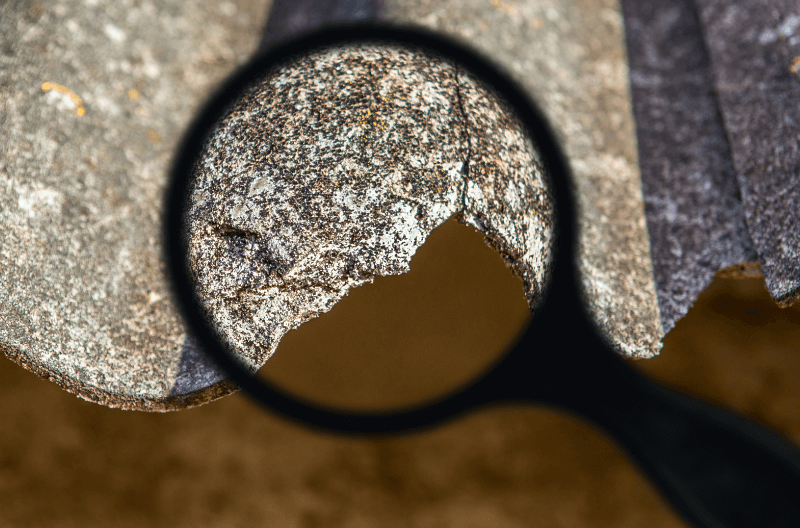
Asbestos, a fibrous mineral once popular in construction for its heat-resistant and insulating properties, is now known to cause serious health problems like asbestosis, lung cancer, and mesothelioma due to asbestos exposure.
Selling a house with asbestos can be daunting, as its presence can lower market value and deter potential buyers. However, navigating the selling process successfully with the right approach and information is possible.
Understanding the different types of asbestos, its potential locations in older homes, and the options for asbestos removal or abatement can help homeowners make informed decisions and attract prospective buyers. To sell your house fast in Cibolo TX, it is essential to address asbestos issues beforehand.
Identifying Asbestos in Your House
Asbestos was commonly used in building materials like floor tiles, roof shingles, drywall, attic insulation, boilers, fireplaces, and popcorn ceilings. To identify the presence of asbestos, start by inspecting areas of your house where asbestos materials are common.
Check the condition of materials, as asbestos fibers are most dangerous when they are disturbed or damaged. Hiring a professional home inspector trained to identify asbestos materials, assess their condition, and recommend necessary actions is recommended for accurate results.
An inspection checklist to sell your house can help ensure all potential asbestos-containing materials get examined. It is a crucial step if we buy houses for cash in San Antonio, as it helps ensure the safety of the new occupants.
Additionally, you should also be aware of the different types of asbestos. There are six primary types of asbestos, but the most common one found in homes is chrysotile, also known as white asbestos. It was used in many building materials due to its heat-resistant properties. However, asbestos exposure, no matter the type, can lead to serious health problems such as asbestosis, mesothelioma, and lung cancer.
Therefore, it is crucial to take the necessary precautions if you suspect the presence of asbestos in your home. If you decide to inspect your home, wear protective clothing and a mask, and do not disturb any materials that may contain asbestos. However, The safest option is to have a professional inspect.
They have the knowledge, experience, and tools to conduct a thorough inspection safely. Remember, a clean bill of health for your home can improve its market value and attract more prospective buyers. On the other hand, failing to address the presence of asbestos can lead to legal issues and reduce the value of your home.
Therefore, addressing this issue before starting the selling process is essential. It’s not just about protecting your investment but also about ensuring the safety and well-being of the new occupants. When you sell your house fast in Cibolo, TX, being upfront and honest about issues, including asbestos, is crucial.
Repairing Asbestos Damage in Your House
If asbestos is found in your house, addressing it before listing the property for sale is crucial. Homeowners have a few options: leaving the asbestos in place, encapsulation, or complete asbestos removal and replacement. Encapsulation involves sealing the asbestos material with a special coating to prevent the release of asbestos fibers.
A licensed professional should do asbestos removal as it involves removing all asbestos-containing materials and disposing of them as hazardous material. It is important to note that removing asbestos may also involve patching or replacing areas like drywall, floor tiles, or roofing materials.
Weigh the pros and cons of each option and consider the cost, health risk, and impact on market value before deciding on the best course of action. Consulting with a real estate agent can help you make the best decision and find prospective buyers looking to buy houses in Converse, TX.
Can You Sell a House with Asbestos As Is
Yes, it is possible to sell a house with asbestos ‘as is.’ However, you’ll want to be transparent with potential buyers about the presence of asbestos. Full disclosure is not only ethically correct– it’s also legally required in many places.
Inform the potential buyer about the location, type, and condition of the asbestos and any past asbestos abatement or remediation efforts.
Having an asbestos inspection and providing the report to potential buyers is also advisable. Some home buyers may be OK with purchasing a property with asbestos, especially if they plan on renovating and addressing the asbestos issue themselves.
However, selling a house ‘as is’ with asbestos may lower its market value, which can be a significant drawback. It may also narrow the pool of interested buyers to those willing to remove asbestos or are interested in the property for other reasons such as location or land value.
Additionally, some mortgage lenders may not approve loans for homes with known asbestos issues, making it harder for buyers to secure financing.
Ultimately, deciding to sell a house with asbestos ‘as is’ depends on various factors, including the local real estate market, the overall condition of the house, and the homeowner’s financial situation. It is always advisable to consult with a real estate professional to determine the right time to sell your house.
Does Asbestos Affect Home Value
Yes, the presence of asbestos can affect a home’s value. Asbestos is considered a health hazard, and its presence may deter potential buyers, leading to a lower market value.
Buyers often consider the cost of asbestos removal or encapsulation, which can be quite high, when offering a house with asbestos. They may ask for a price reduction to cover the costs of addressing the asbestos issue.
Additionally, some buyers may be unwilling to take on the responsibility and potential health risks of dealing with asbestos, leading to a smaller pool of interested buyers. Considering the legal obligations and potential liabilities of selling a property with known asbestos is also crucial.
Failure to disclose the presence of asbestos may lead to future legal issues and financial liabilities. Therefore, while selling a house with asbestos is possible, it will likely affect the market value, the pool of interested buyers, and the overall selling process.
To ensure the best outcome, consulting with a professional real estate agent with experience in dealing with properties with asbestos is advisable.
They can guide the best action, whether addressing the asbestos issue before listing the property, adjusting the asking price, or providing full disclosure to potential buyers.

Do You Have to Disclose Asbestos When Selling a House
When selling a house, it is usually required to disclose the presence of asbestos for legal and ethical reasons. Failure to disclose can lead to legal and financial liabilities. Besides being a legal obligation, it’s also an ethical one, as buyers deserve to know about any potential health risks associated with a property before making a decision.
Full disclosure about asbestos’s presence, location, and condition should be provided, including any past asbestos abatement or remediation efforts. That helps build trust with potential buyers and may expedite the selling process. Consulting with a real estate professional or legal advisor is recommended to understand the specific disclosure requirements in your jurisdiction.
Additionally, the Environmental Protection Agency (EPA) and various state and local regulations require the proper handling and disclosure of asbestos in properties. Many home buyers will request a home inspection, which includes a thorough inspection for hazardous materials like asbestos. Therefore, it is in the seller’s best interest to be upfront about any known asbestos in the property.
That can prevent any surprises during the home inspection, which can delay or even derail a sale. Moreover, disclosing the presence of asbestos can also protect the seller from future legal claims by the buyer.
If the buyer later discovers asbestos that was not disclosed and suffers health problems, they may have legal grounds to sue the seller for damages. Full and honest disclosure is the right and smart thing to do from a legal and financial standpoint.
Remember that the rules and regulations regarding asbestos disclosure can vary from location to location. Familiarize yourself with your area’s local laws and regulations. Consulting with a local real estate agent or a legal professional can provide valuable insights into your jurisdiction’s specific disclosure requirements.
For example, in some areas, the seller may be required to provide documentation of any asbestos abatement or remediation efforts. Other places may require the seller to provide an asbestos inspection report from a licensed professional. It’s always best to err on caution and provide potential buyers with as much information as possible.
That can help expedite the selling process and ensure a smooth transaction for all parties involved. If you want to expedite the selling process, remember that we buy houses in Converse, TX, and can provide a cash offer for your property, even if it has asbestos.
How to Sell Your House with Asbestos As Is
Selling a house with asbestos ‘as is’ can be challenging but possible with the right approach. Firstly, have a professional asbestos inspection to determine the presence, type, and condition of asbestos in your home.
Secondly, be transparent and fully disclose to potential buyers about the asbestos and any past abatement or remediation efforts. Thirdly, consider the cost of asbestos removal or encapsulation and adjust the asking price accordingly, as some buyers may be willing to take on the responsibility of dealing with the asbestos in exchange for a lower price.
Target buyers who may be interested in purchasing a property ‘as is,’ such as investors, developers, or DIY enthusiasts. Also, be prepared for negotiations, as buyers may ask for a price reduction to cover the costs of asbestos removal or encapsulation.
Lastly, seek the advice of a real estate professional with experience in dealing with properties with asbestos.
Conclusion
Selling a house with asbestos is a challenging process, but with the right approach, it is possible. Transparency, full disclosure to potential buyers, adjusting the asking price, targeting the right audience, and being prepared for negotiations are all crucial steps.
Consulting a real estate professional experienced in dealing with properties with asbestos can provide valuable guidance and support. Ultimately, the goal is to sell your property for the best possible price while minimizing potential legal liabilities and maximizing your return on investment.
